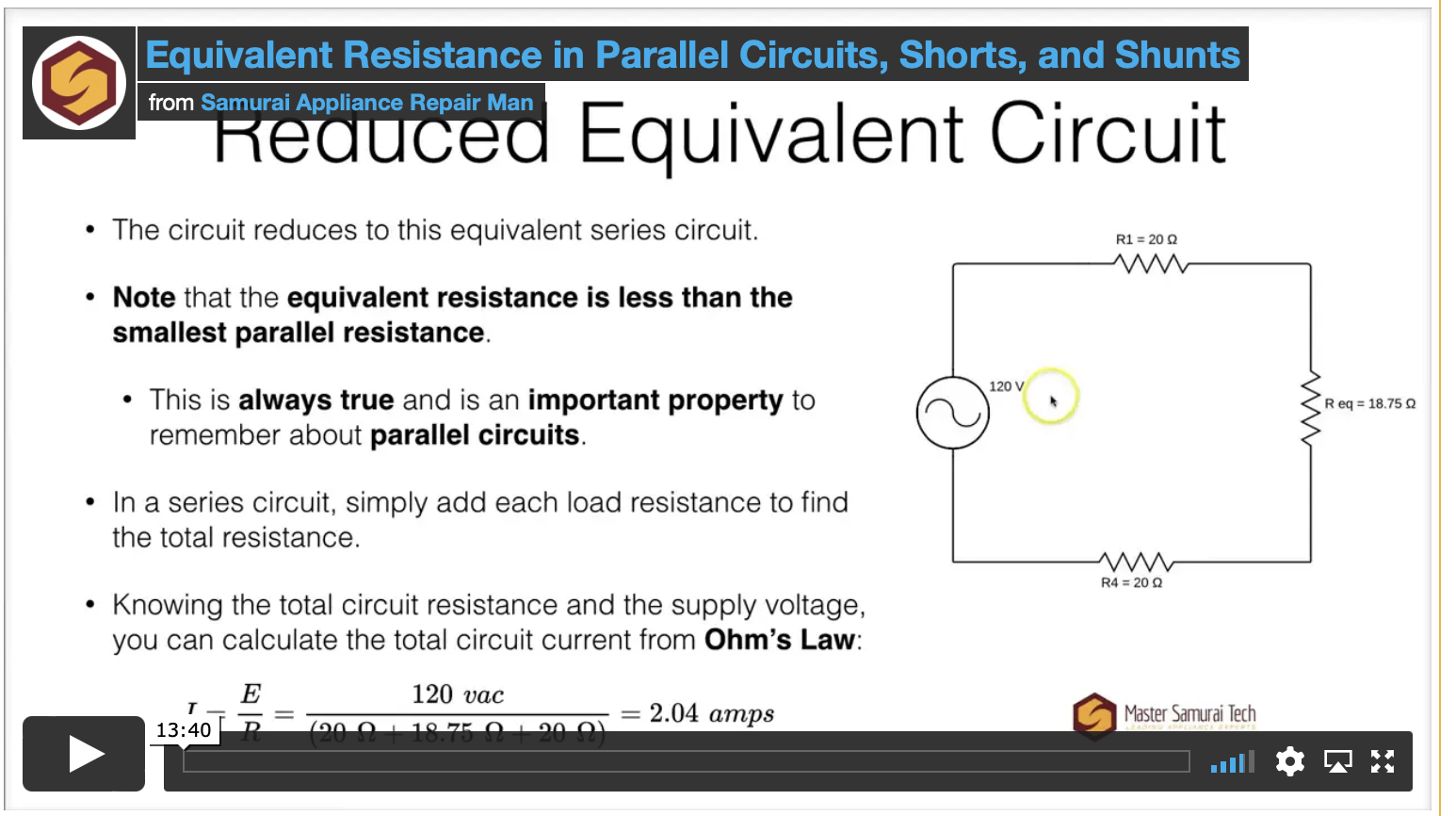Forum Replies Created
-
AuthorPosts
-
I just replied to your email, Jerromy.
One of the interesting things about appliance repair is that there is a lot of variety of configurations that you will encounter.
Hi Lucas,
Question 6:
You did two steps to find the answer
1. Find the circuit current, then
2. Use the circuit current and the resistance of the loose connection to find P, watts for the loose connectionIn step one, you are looking for the current in the entire circuit. Remember, in a series circuit, the current is the same throughout. And, it is determined by the *total* resistance in the circuit. But then in step 2, you are focussing on just the heat generated by the 6 ohm connection.
Does that answer your question?
Question 7:
There is a failure in the element circuit. Does that impact the fan motor circuit at all? (They are parallel)Question 8:
Did you read the Help Page entry on this? The key is understanding the impact that the closed detector switch has on the circuits. I can step you through this one a little more if need be, but I want to make sure you’ve already thought about what we wrote on the Help Page.Question 9:
Did you read the Help Page entry on this, including going to the link to another forum topic? Let me know.This is a screenshot from one of the videos in Unit 5:

We also quizzed you on it in that unit quiz.
Do you see it?
Great! Glad to help.
Hi Richard,
I always have to think through this carefully myself, staring at the cutaway diagram we give you in that lesson and thinking it through.
If the regulated pressure decreases, then the valve is going to want to let more gas come through to maintain the pressure. That is what you are missing, I think, that the valve wants to maintain a certain pressure. When the regulated pressure goes down a little, the valve will open a little more to let more through, and vice versa. It will constantly be adjusting up and down.
So – when the regulated pressure decreases, the diaphragm will go down to let more gas flow through to raise the pressure on the regulated side.
Does that make sense?
haha – it is in the “Campus Support” menu
I reset youPlease check your email, Justin. I just replied there.
Yes we did, and I just replied to it.
The output of a load IS in watts (or another unit of work, like hp or BTUH)
However, most techs don’t have a wattmeter, so we can use amp and voltage drop readings as a proxy for watts.
Does that answer your question? I wasn’t quite sure why you asked it.
I replied to your most recent contact form via email and it bounced again. You were wondering about your scores in the Appliantology 101 course and Certification. Here’s my reply:
“You are fine. We don’t certify that short course – just the full-length technical courses.”
If we didn’t give “Power” as an answer choice, then current would be the next best answer. But power is the correct answer.
We emphasize power/watts in a number of places in the Basic Electricity module, for example, in Unit 1:
“Load: A component in a circuit that, when power is applied, converts electricity to heat, light, or motion.”
“Power” is a technical term – it is not interchangeable with volts or amps. It is watts.
The ratings of most loads are given in “watts”.
Power (watts is the most common unit of power that we deal with in appliance repair), which is voltage AND current.
Loads basically convert energy into work. So they need watts in order to produce watts.
Hi Elijah,
It loaded okay for me just now – read the Video Playback section at the bottom of this page for things to try on your end. Let me know if you continue to have a problem.
https://my.mastersamuraitech.com/appliance-repair-course-support/student-resource-page/
I just checked the Kleinert text and didn’t see a reference to it. I think it’s a minor point – just something for techs to be aware of. Samurai says that the main thing to know is what it is. And that since it is a safety feature of the valve, it should be left alone.
I’ll pass this along and we can consider marking up the diagram to add clarity for those who might need it.
-
AuthorPosts